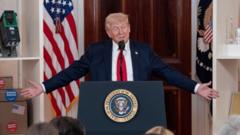In a recent address to business leaders, Donald Trump requested patience as the U.S. economy faces its first contraction in three years, igniting recession concerns among Americans.
Trump Appeals to Business Leaders for 'Time' Amidst Economic Contraction

Trump Appeals to Business Leaders for 'Time' Amidst Economic Contraction
Former President cites misleading GDP data and blames predecessor as recession fears loom.
In an event at the White House, President Trump highlighted the misleading nature of the recent economic data, stating that an annualized contraction of 0.3% was heavily influenced by businesses stockpiling imports ahead of his controversial tariffs. He reassured attendees that substantial investments amounting to $8 trillion had been promised to rejuvenate the American manufacturing sector.
This economic downturn follows a growth rate of 2.4% in the previous quarter and coincides with Trump's 100 days in office, during which public sentiment has turned sour regarding his economic leadership. Controversially, Trump placed the blame for the current economic troubles on President Joe Biden, stating, "This is Biden's economy because we took over on January 20th." This statement drew sharp criticism from Democratic leaders, including House Minority Leader Hakeem Jeffries, who asserted, "This is not Joe Biden's economy, Donald; this is your economy."
At the White House gathering, Trump underscored commitments from major corporations, introducing industry leaders from Hyundai, Toyota, and Johnson & Johnson. He also called for the passage of his tax reform proposal, which aims for significant tax cuts and spending reductions but is facing resistance from Democrats and some within his own party.
On the topic of potential shortages due to decreasing trade with China, Trump downplayed concerns, suggesting that children may adjust to receiving fewer toys at a slightly higher price. As part of his trade policy, Trump has imposed tariffs of 10% on a majority of imports from various countries, with even steeper tariffs on goods from China that have escalated tensions into a trade war.
As the situation develops, the economic implications of Trump's policies continue to be closely monitored both domestically and internationally, with questions surrounding the sustainability of growth in the United States.
This economic downturn follows a growth rate of 2.4% in the previous quarter and coincides with Trump's 100 days in office, during which public sentiment has turned sour regarding his economic leadership. Controversially, Trump placed the blame for the current economic troubles on President Joe Biden, stating, "This is Biden's economy because we took over on January 20th." This statement drew sharp criticism from Democratic leaders, including House Minority Leader Hakeem Jeffries, who asserted, "This is not Joe Biden's economy, Donald; this is your economy."
At the White House gathering, Trump underscored commitments from major corporations, introducing industry leaders from Hyundai, Toyota, and Johnson & Johnson. He also called for the passage of his tax reform proposal, which aims for significant tax cuts and spending reductions but is facing resistance from Democrats and some within his own party.
On the topic of potential shortages due to decreasing trade with China, Trump downplayed concerns, suggesting that children may adjust to receiving fewer toys at a slightly higher price. As part of his trade policy, Trump has imposed tariffs of 10% on a majority of imports from various countries, with even steeper tariffs on goods from China that have escalated tensions into a trade war.
As the situation develops, the economic implications of Trump's policies continue to be closely monitored both domestically and internationally, with questions surrounding the sustainability of growth in the United States.




















